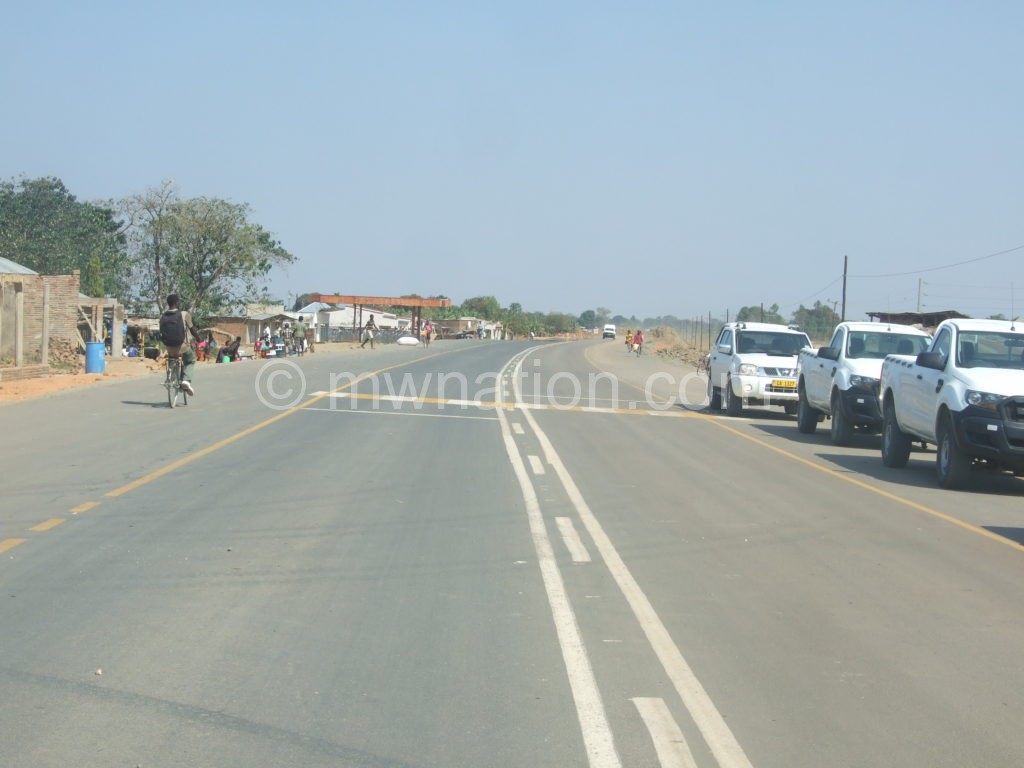The Karonga-Songwe Road has developed premature flaws just after its rehabilitation drained K24.7 billion, prompting fresh repair plans that might cost taxpayers a fortune, it has emerged.
The 2023/24 Public Sector Investment Programme (PSIP) report confirms the development, pointing out that: “the project was completed but developed premature distress and a technical auditor was engaged and proposed remedial measures.”
Part of the section that has been completed
Chinese firm Zhejiang Communication Construction Company was the contractor of the project, which started in 2017 and was completed two years later.
Premature distress is the decline of the road before its design life. In the Karonga-Songwe Road case, the Roads Authority (RA) in a response to our questionnaire attributed it to poor workmanship.
RA spokesperson Portia Kajanga said: “The technical auditor completed the assessment and submitted a final report. The RA is carrying out the necessary processes to facilitate implementation of the recommendations made in the report.
“The technical audit attributed the premature failure of the pavement to the mix proportions of the finished asphalt concrete which was different to what the contractor had submitted in his Marshall mix design.
“It was further noted that premature failure was as a result of water ingress through the asphalt concrete due to higher voids in the asphalt concrete.”
Kajanga said the RA was disappointed with the road’s collapse and has engaged the contractor to address the flaws.
“As government, we are bothered, that is why after noticing the premature failure, a technical auditor was engaged to find out what caused the problem.
“It should be noted that the government has not taken over the road until the defects are rectified. The onus of remedying defective work lies with the contractor.
The contractor’s representative Bella Liu said the firm was in discussions with the RA on how to proceed on addressing the defects. She declined to make any further comments.
The road decline has meanwhile irked the Parliamentary Committee on Transport and Public chairperson Enock Phale.
In a response to our questionnaire, he said: “We equally want to express our concerns for what seemingly points to poor workmanship … on this road which in the long run will result in loss of our hard-earned money.”
The road serves as the lifeblood for the country’s trade as it carries 22 percent of the country’s foreign trade to Songwe, the border point with Tanzania.
Fuel, second-hand cars and fertiliser form part of the essential imports that are transported through the 46-kilometre stretch.
According to the PSIP document, authored by the Ministry of Finance, the project goals among others were “improved safety and security of passengers and goods with the improved access and improved road infrastructure.”
The other objective was to reduce “travel time and costs for users of the road.”
The World Bank financed the project, injecting $24 million (K24.7 billion at current exchange rate), records show.
“The project will include the resurfacing of the road, the repair of any existing damage, and the installation of any necessary safety features,” the PSIP document reads.
The parliamentary committee chairperson, in a response to our questionnaire, further attributed the shoddy public infrastructure work to rigid procurement laws.
“There is definitely no value for money on this busy Karonga–Songwe Road stretch. This is the very reason my committee has time and again emphasised on the need for our procurement laws to be revised.
“They should provide flexibility of selection to avoid being stuck to selecting the lowest bidder which should, among other things, consider competencies and capacities,” he said.
Phale warned that failure to amend the legislation “these challenges will be persistent and will end up being expensive to the country to rehabilitate such infrastructure.”
“Nevertheless, as chair of the committee, I am pleased to note that government has made a commitment to work on the past mistakes on this road and that has made resources available for the rehabilitation along the affected stretch,” he said.
Phale further said his committee will collaborate with government “to make sure that we intensively visit and monitor the rehabilitation of the road once the work starts just as we are doing with all other construction projects.”
On his part, National Construction Industry Council chief executive officer Lyford Gideon said shoddy workon public infrastructure was hurting the public due to extra expenditures.
However, he expressed hope that the problem will be addressed. Gideon said: “I am aware of several interventions that are in place to ensure that projects run smoothly and achieve intended objectives.
“One of such interventions, among several, is the introduction of the Malawi Infrastructure Delivery Management Standards.”
As the government is carrying out multi-billion kwacha upgrading and rehabilitation on the M1, the Karonga-Songwe stretch was spared due to its recent repairs.
The post K24bn road rehabilitation turns into nightmare appeared first on The Nation Online.
 Moni Malawi
Moni Malawi 

